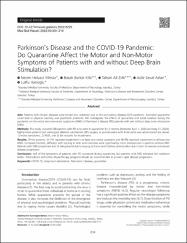| dc.contributor.author | Helvacı Yılmaz, Nesrin | |
| dc.contributor.author | Bolluk Kılıç, Başak | |
| dc.contributor.author | Zırh, Tahsin Ali | |
| dc.contributor.author | Aslan, Asile Seval | |
| dc.contributor.author | Hanoğlu, Lütfü | |
| dc.date.accessioned | 2022-07-21T09:31:24Z | |
| dc.date.available | 2022-07-21T09:31:24Z | |
| dc.date.issued | 2022 | en_US |
| dc.identifier.citation | Helvacı Yılmaz, N., Bolluk Kılıç, B., Zırh, T. A., Aslan, A. S. ve Hanoğlu, L. (2022). Parkinson's disease and the COVID-19 pandemic: Do quarantine affect the motor and non-motor symptoms of patients with and without deep brain stimulation? The Medical Bulletin of Haseki, 60(3), 204-210. http://doi.org/10.4274/haseki.galenos.2022.8225 | en_US |
| dc.identifier.issn | 1302-0072 | |
| dc.identifier.issn | 2147-2688 | |
| dc.identifier.uri | http://doi.org/10.4274/haseki.galenos.2022.8225 | |
| dc.identifier.uri | https://hdl.handle.net/20.500.12511/9590 | |
| dc.description.abstract | Aim: Patients with chronic diseases were forced into lockdown due to the coronavirus disease-2019 pandemic. Extended quarantine could lead to physical inactivity and psychiatric problems. We investigated the effects of quarantine and social isolation during the pandemic on the motor and non-motor symptoms (NMS) of Parkinson's disease (PD) patients with and without deep brain stimulation (DBS).
Methods: This study included 168 patients with PD who were in quarantine for 2 months (between April 1, 2020 and May 31, 2020). Eighty-three patients had undergone bilateral subthalamic DBS surgery. A questionnaire with three parts was administered via phone: 1) motor symptoms, 2) NMS, and 3) the reasons for impairment.
Results: Of the patients, 54.7% reported impairment in at least one motor symptom and 58.9% reported impairment in at least one NMS. Increased tremors, difficulty with turning in bed, and insomnia were significantly more pronounced in patients without DBS. Patients with DBS complained less of being bored due to staying at home and had less deterioration due to lack of exercise and slower disease progression.
Conclusion: Half of the symptoms of patients with PD worsened during quarantine, but patients with DBS tolerated the lockdown better. Telemedicine and online physiotherapy programs should be recommended to prevent rapid disease progression. | en_US |
| dc.language.iso | eng | en_US |
| dc.publisher | Galenos Publishing | en_US |
| dc.rights | info:eu-repo/semantics/openAccess | en_US |
| dc.subject | COVID-19 | en_US |
| dc.subject | Deep Brain Stimulation | en_US |
| dc.subject | Parkinson’s Disease | en_US |
| dc.subject | Quarantine | en_US |
| dc.title | Parkinson's disease and the COVID-19 pandemic: Do quarantine affect the motor and non-motor symptoms of patients with and without deep brain stimulation? | en_US |
| dc.type | article | en_US |
| dc.relation.ispartof | The Medical Bulletin of Haseki | en_US |
| dc.department | İstanbul Medipol Üniversitesi, Tıp Fakültesi, Dahili Tıp Bilimleri Bölümü, Nöroloji Ana Bilim Dalı | en_US |
| dc.department | İstanbul Medipol Üniversitesi, Tıp Fakültesi, Cerrahi Tıp Bilimleri Bölümü, Beyin ve Sinir Cerrahisi Ana Bilim Dalı | en_US |
| dc.authorid | 0000-0001-7566-1063 | en_US |
| dc.authorid | 0000-0002-7712-738X | en_US |
| dc.authorid | 0000-0002-8811-2263 | en_US |
| dc.authorid | 0000-0002-2761-0031 | en_US |
| dc.authorid | 0000-0003-4292-5717 | en_US |
| dc.identifier.volume | 60 | en_US |
| dc.identifier.issue | 3 | en_US |
| dc.identifier.startpage | 204 | en_US |
| dc.identifier.endpage | 210 | en_US |
| dc.relation.publicationcategory | Makale - Uluslararası Hakemli Dergi - Kurum Öğretim Elemanı | en_US |
| dc.identifier.doi | 10.4274/haseki.galenos.2022.8225 | en_US |
| dc.institutionauthor | Helvacı Yılmaz, Nesrin | |
| dc.institutionauthor | Bolluk Kılıç, Başak | |
| dc.institutionauthor | Zırh, Tahsin Ali | |
| dc.institutionauthor | Aslan, Asile Seval | |
| dc.institutionauthor | Hanoğlu, Lütfü | |
| dc.identifier.wos | 000823150600003 | en_US |
| dc.identifier.scopus | 2-s2.0-85133833708 | en_US |
| dc.identifier.scopusquality | Q4 | en_US |


















